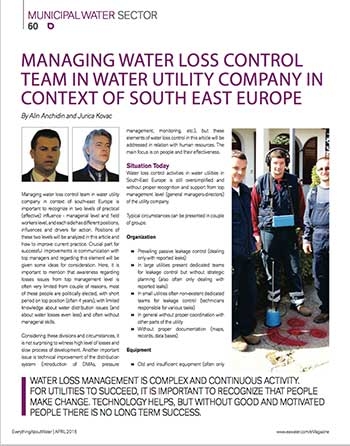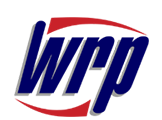Managing water loss control team in water utility company in context of south east Europe.
Managing water loss control team in water utility company in context of south-east Europe is important to recognize in two levels of practical (effective) influence - managerial level and field workers level, and each side has different positions, influences and drivers for action. Positions of these two levels will be analyzed in this article and how to improve current practice. Crucial part for successful improvements is communication with top managers and regarding this element will be given some ideas for consideration. Here, it is important to mention that awareness regarding losses issues from top management level is often very limited from couple of reasons, most of these people are politically elected, with short period on top position (often 4 years), with limited knowledge about water distribution issues (and about water losses even less) and often without managerial skills.
Considering these divisions and circumstances, it is not surprising to witness high level of losses and slow process of development. Another important issue is technical improvement of the distribution system (introduction of DMAs, pressure management, monitoring, etc.), but these elements of water loss control in this article will be addressed in relation with human resources. The main focus is on people and their effectiveness.
Situation Today
Water loss control activities in water utilities in South-East Europe is still oversimplified and without proper recognition and support from top management level (general managers-directors) of the utility company.
Typical circumstances can be presented in couple of groups:
Organization
- Prevailing passive leakage control (dealing only with reported leaks)
- In large utilities present dedicated teams for leakage control but without strategic planning (also often only dealing with reported leaks)
- In small utilities often non-existent dedicated teams for leakage control (technicians responsible for various tasks)
- In general without proper coordination with other parts of the utility
- Without proper documentation (maps, records, data bases)
Equipment
- Old and insufficient equipment (often only ground microphones, occasionally leak locating correlators, rarely mobile flow meters, pressure loggers, pipe locators)
- Without programs for regular renewal of the equipment
- Equipment used with minimal capabilities - for example no use of sound filtering on listening equipment
- Advanced equipment (flow meters, pressure loggers) if present is rarely used
Knowledge
- Without knowledge beyond personal experience (based on field work)
- Familiar with basic functions of the equipment
- Without advanced knowledge in water loss control (IWA methodology)
- Without education programs
- Without opportunity to participate on conferences and fairs
Communication
- Without dedicated reports
- Without regular meetings
- Without strategic programs and plans
- Rewarding - salaries
- Often people responsible for leak detection have same salaries as other technicians (plumbers)
- Without rewarding program
This neglected position of people responsible for leak detection and other tasks related with water loss issue has for outcome low motivation and insufficient results in water loss control activities.
Low motivation leads to bad habits and in many utilities is present attitude among people that can be present with following statement “you cannot pay me as little as I can work little”. In addition even if someone (managers) want to introduce and implement changes (improvements based on new approach, organization, discipline, control) what they will face is strong resistance from workers (why change, do we have any benefit from it, anyway our working position is not in jeopardy considering we are employees in public company with strong protection from workers unions).
Read more in attached PDF

